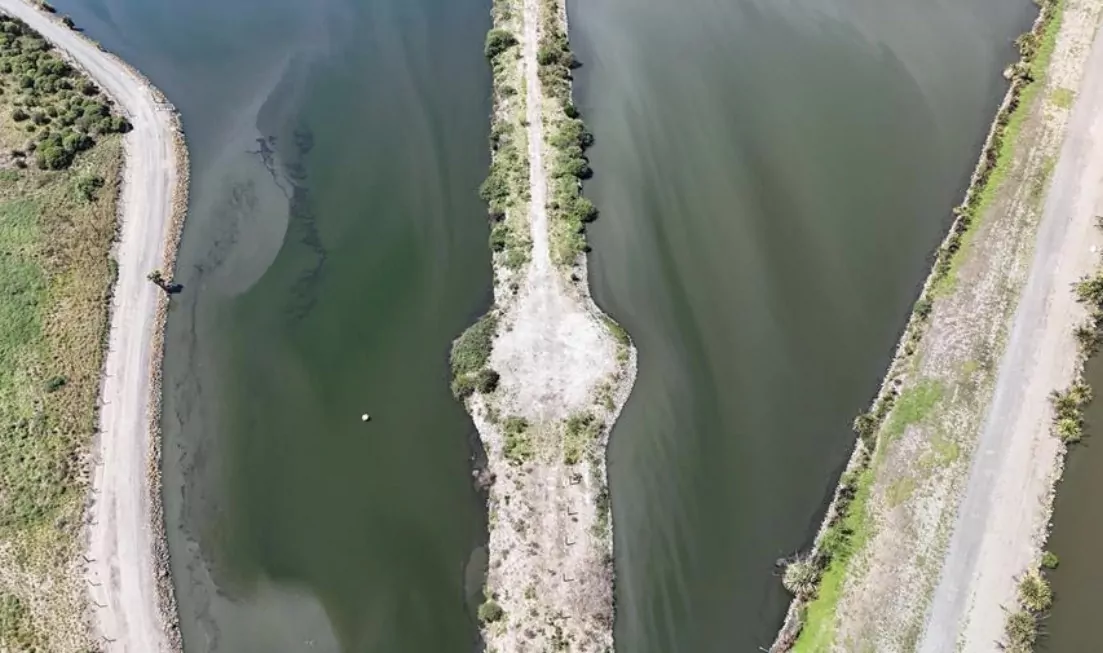Escaped youth tracked by Eagle helicopter, found hiding in New Brighton
The young person who escaped from a youth justice facility in Rolleston has been located...
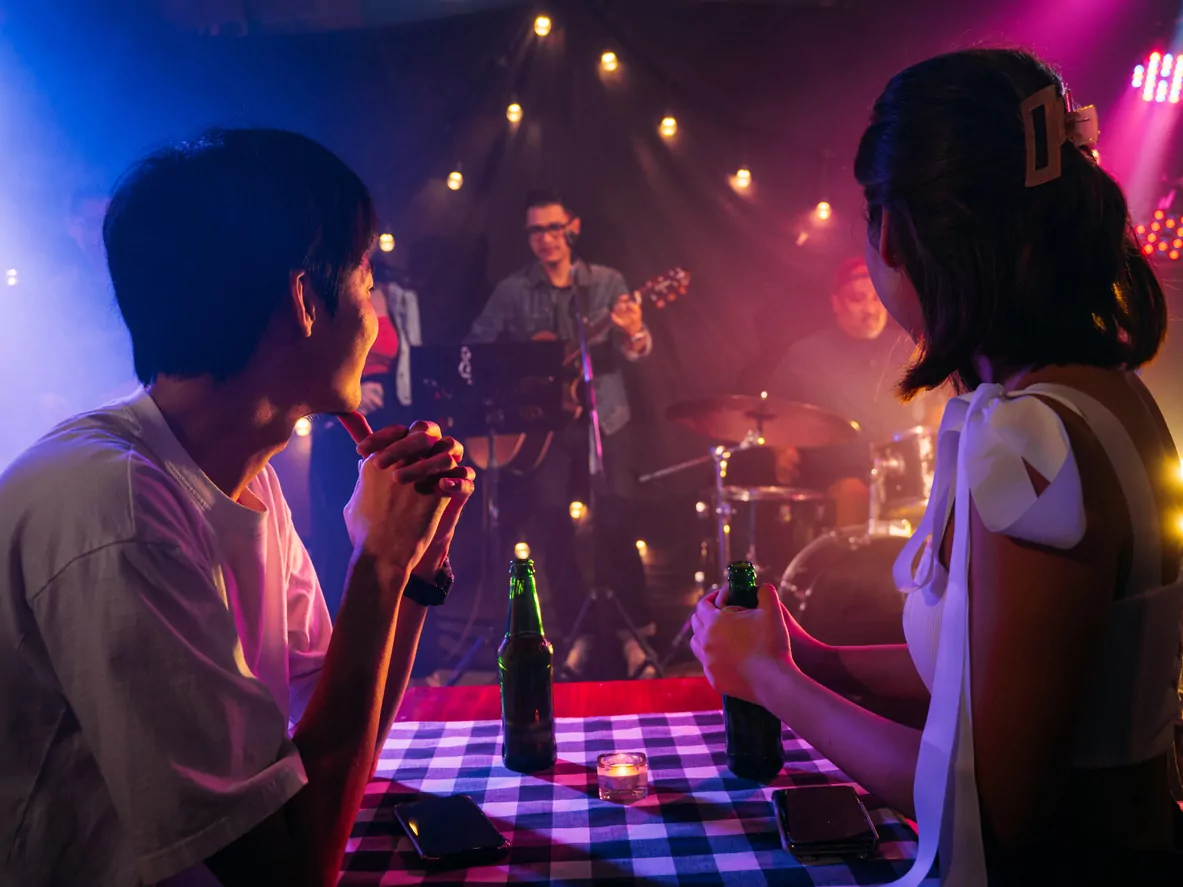
Christchurch central city candidates and the councillor with the entertainment portfolio have weighed in on a council proposal that could reshape how noise is managed in the CBD.
The plan was developed in response to tensions between residents and music venues, and seeks to raise noise limits to protect the future of the city’s live music scene.
Council staff will present feedback from consultation next week at a workshop, though progress on the plan has been disrupted by the Government’s new “Plan Stop” legislation, which blocks most new plan changes, unless exemptions are granted.
Feedback released today from council shows strong support, with 1,233 submitters (87 percent) backing the draft plan.
However, central city residents were less likely to support it than people in other suburbs (66 percent compared to 88–95 percent elsewhere).
Supporters cited benefits for live music venues, nighttime businesses, and overall vibrancy in the central city.
Central City candidate and musician Tom Roud said PC21 had become a hot issue because of the looming opening of Te Kaha stadium.
“PC21 is a proposed plan change that would raise the maximum noise limits in sections of the CBD considerably.
“It’s been highlighted because of the looming opening of the stadium at Te Kaha and the concerts that will be attracted to that venue, the question of noise limits in the CBD has been brought front of mind. Te Kaha has an exemption for their noise limits – but what about the pubs and venues nearby?
“Te Kaha provided council with the opportunity to address some sound related issues that have built up since the earthquake, particularly around live music venues and where they are located.
“You may have heard about the ‘precinct’ model for the Christchurch rebuild and how this one area will be about this and this one about this other thing and so on and so forth.
“But that’s not really how cities develop. People find a way, communities find a way, they work together, they build what they need wherever they can and so some development and some venues are in places where Council maybe wasn’t expecting.
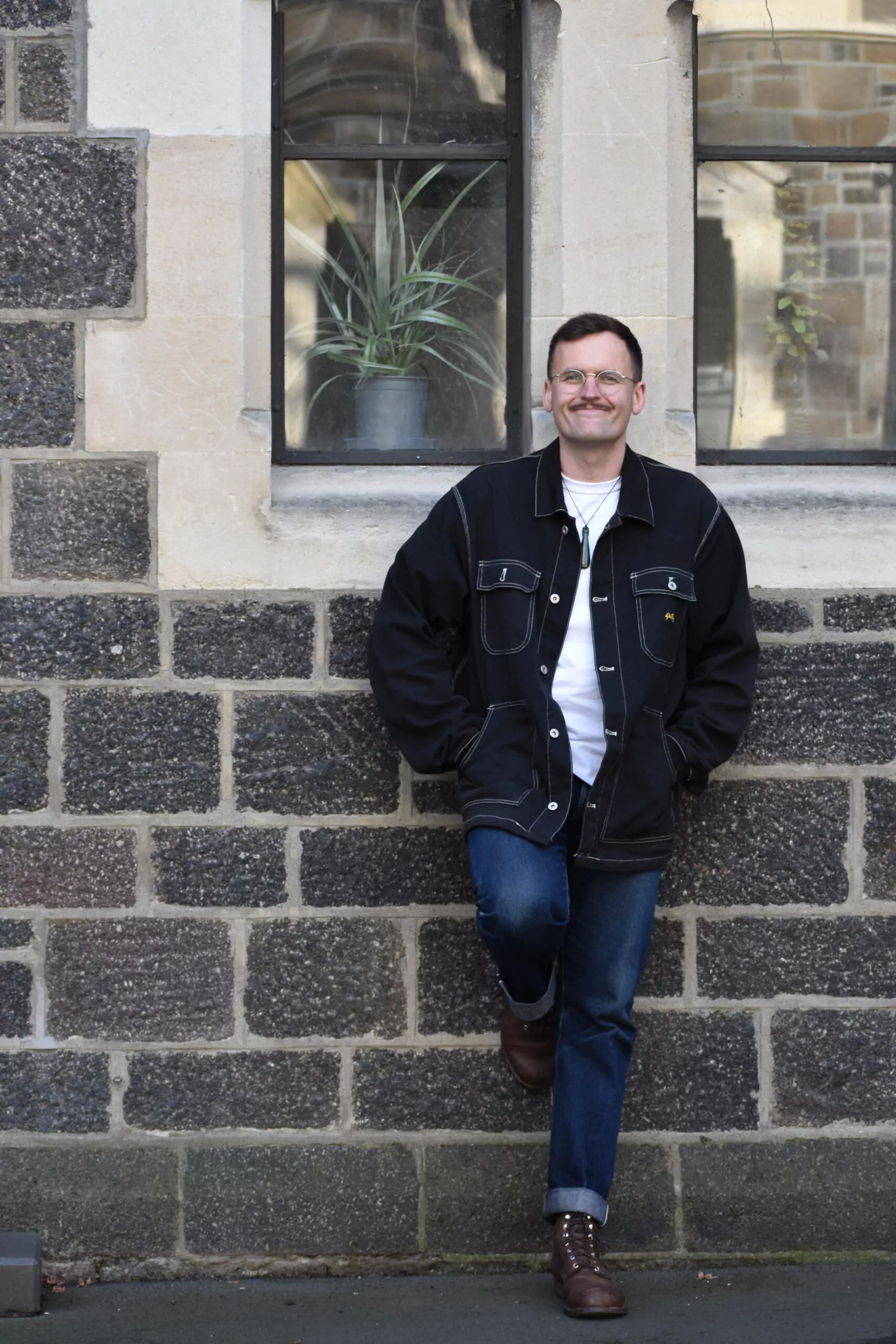
Central City candidate and musician Tom Roud / Supplied
“We’ve got venues in the South East of the CBD that popped up and basically saved Christchurch local live music from being totally munted after the quakes.
“They’re just next to the stadium, and PC21 includes that part of town. The map for PC21 also spans up Victoria Street, and at a recent candidates forum with some of the locals current City Councillor Jake McLellan, and one of his contenders Raf Manji indicated they would vote against PC21 in its current, recommended form because of the encroachment into Victoria Street.
“I get the resident point of view there, they want a good night’s sleep, as we all do. Post earthquake Victoria Street the bar and club scene could be a bit feral at times. But that’s not the case any more. These days that section of Victoria Street is, if anything, a bit commercially problematic. The remaining venues and bars don’t get close to breaching current noise limits – let alone any raised limits should PC21 pass. The main areas of ‘town’ have shifted.
“Nonetheless, Council could take some obligation to protect the rights of residents who are concerned about their neighbourhoods. My platform includes establishing a contestable fund for venues to apply for grants that will help with soundproofing. We should legislate on new builds having higher code specifications for soundproofing, and we should make sure that any new residences near established venues can’t be advertised with false information – whether an AirBNB, a rental, or for sale. Why I am concerned about Jake and Raf’s answers, though, is that Plan Changes are getting harder to get done with the current government in Wellington – who are stripping local authorities, like Councils, of being able to do anything. Should PC21 be rejected we could easily get stuck with a dead Central City, stripped of vibrancy, without much clear recourse to fix it so long as Councils have their hands tied by central government. This would be deeply embarrassing.”
Current Central City councillor Jake McLellan said more work was needed before he could support the plan. “It’s not a choice between the initial option or doing nothing, with any plan change, we listen to the public’s feedback and adjust based on their response. As it stands, PC21 needs further work, before I could support it. I look forward to improving the plan based on public submissions. I want a plan change that keeps our city both vibrant and liveable.

Christchurch Central Councillor Jake McLellan
“I’m committed to representing residents voices at the council table. I’m sure we can achieve a plan change that lets live music venues on St Asaph Street continue operating while protecting residential areas across the city fringe from excessive noise moving into their areas.”
Central City candidate Hayley Guglietta said both residents and businesses could be supported. “I support a balanced approach that protects residents’ right to a good night’s sleep while fostering a vibrant central city with thriving nightlife and stadium events. We can achieve this through better building standards, designated entertainment zones, smart urban design, and open communication between residents, venues, and Council. With good planning, we don’t have to choose between livability and vibrancy, we can have both. There are plenty of other cities around the world that have achieved this balance.”
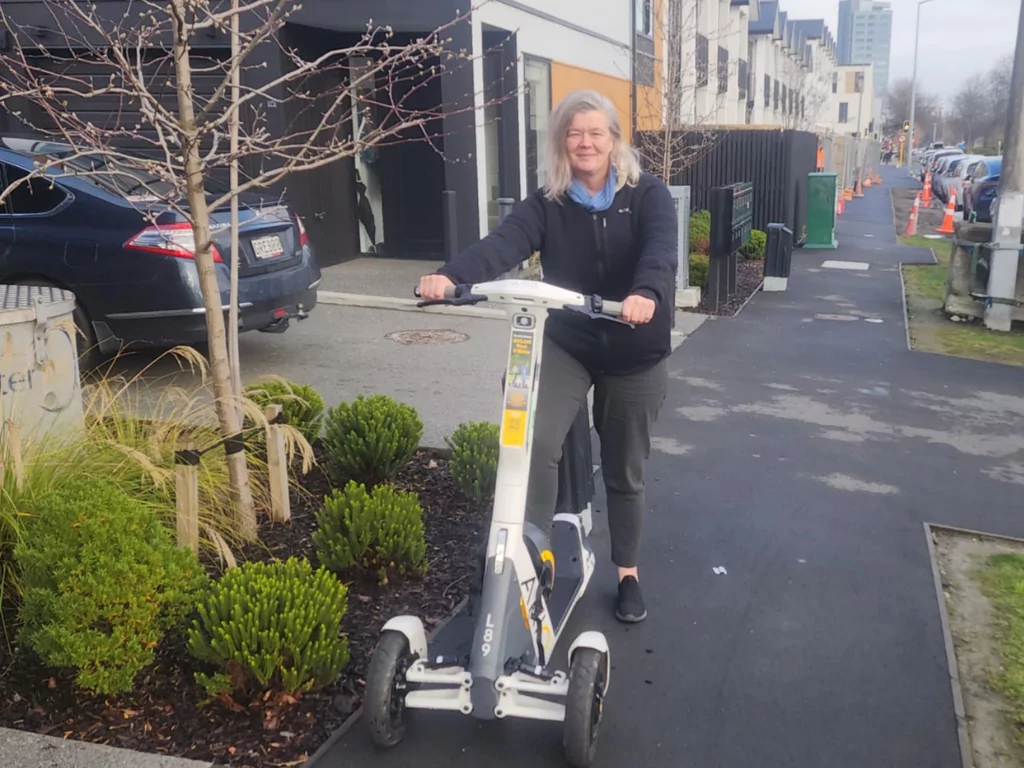
Christchurch Central City Council Candidate Christchurch Central Ward council candidate Hayley Guglietta
Former councillor and Central candidate Raf Manji said he backed a vibrant nightlife but with limits in some areas. “As a former nightclubber, I support a vibrant night time offering. As the only candidate living in the heart of the central city, I’m used to a bit of noise at night. I have no issues with that and it’s great to hear people enjoying themselves.
“As far as PC21 goes, I support the proposed changes to expand the Category 1 area south of Armagh Street (could go even further in the SALT/NOMO area). However, I think we should leave the Victoria Street area as it is. That’s fine for bars but not clubs. It’s primarily a well-established residential area with restaurants and bars but not really a late night party area.
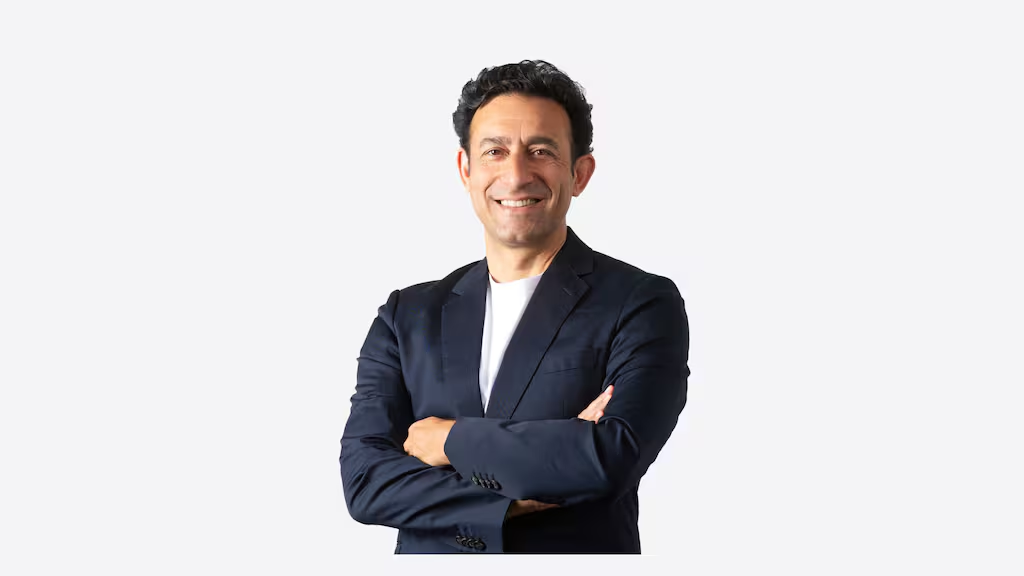
Former Councillor Raf Manji
“Proper noise insulation is important. This was discussed constantly prior to the stadium even being funded or built and everyone has known about the potential noise impacts. My big ask from the hospitality and entertainment operators is that they make sure we have clean and tidy streets to wake up to in the morning. Residents can put up with a bit of noise but not rubbish littering the streets. If we all work together, we can deliver a fun experience for everyone. Who knows, I might even hit the floor myself.”
Halswell Councillor Andrei Moore who currently holds the Arts and Creative Industries portfolio at said “we’ve got live music venues like Darkroom who went all in on our central city when we needed them most and set up after the earthquakes in 2011 when live music was almost non-existent in our central city. Sure enough, these days they’re getting shut down as early as 10:17pm because people decided to move in right next door and start making noise complaints almost immediately. It’s a disgrace. They’re now having to fundraise to keep the lights on because our Council’s settings have failed them.
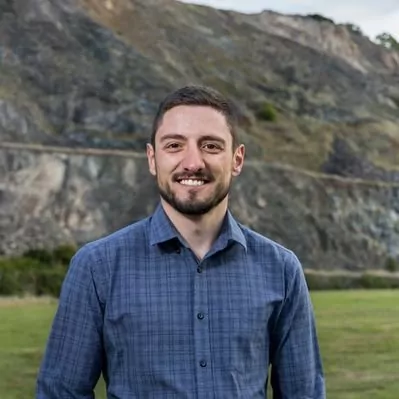
Halswell Councillor Andrei Moore
“It’s embarrassing that after tens of billions was invested in rebuilding a city which we’re trying to revitalise, that we still have noise settings that allow someone to move in next door to a long-standing live music venue and shut them down immediately.
“It would be even more embarrassing if we invested $673 in a new stadium that was intended to support inner-city businesses but the surrounding businesses aren’t even allowed to do business. The clock is ticking on avoiding a significant reputational issue for our city when this thing opens.
I’d challenge anyone to come up with a better plan that does. Spoiler: no one will. It’s based on extensive research and evidence from other cities and huge amounts of feedback we’ve heard from our community” Moore said.
WHAT ARE THE CHANGES?
Category 1 (orange area on the map below)
Road noise
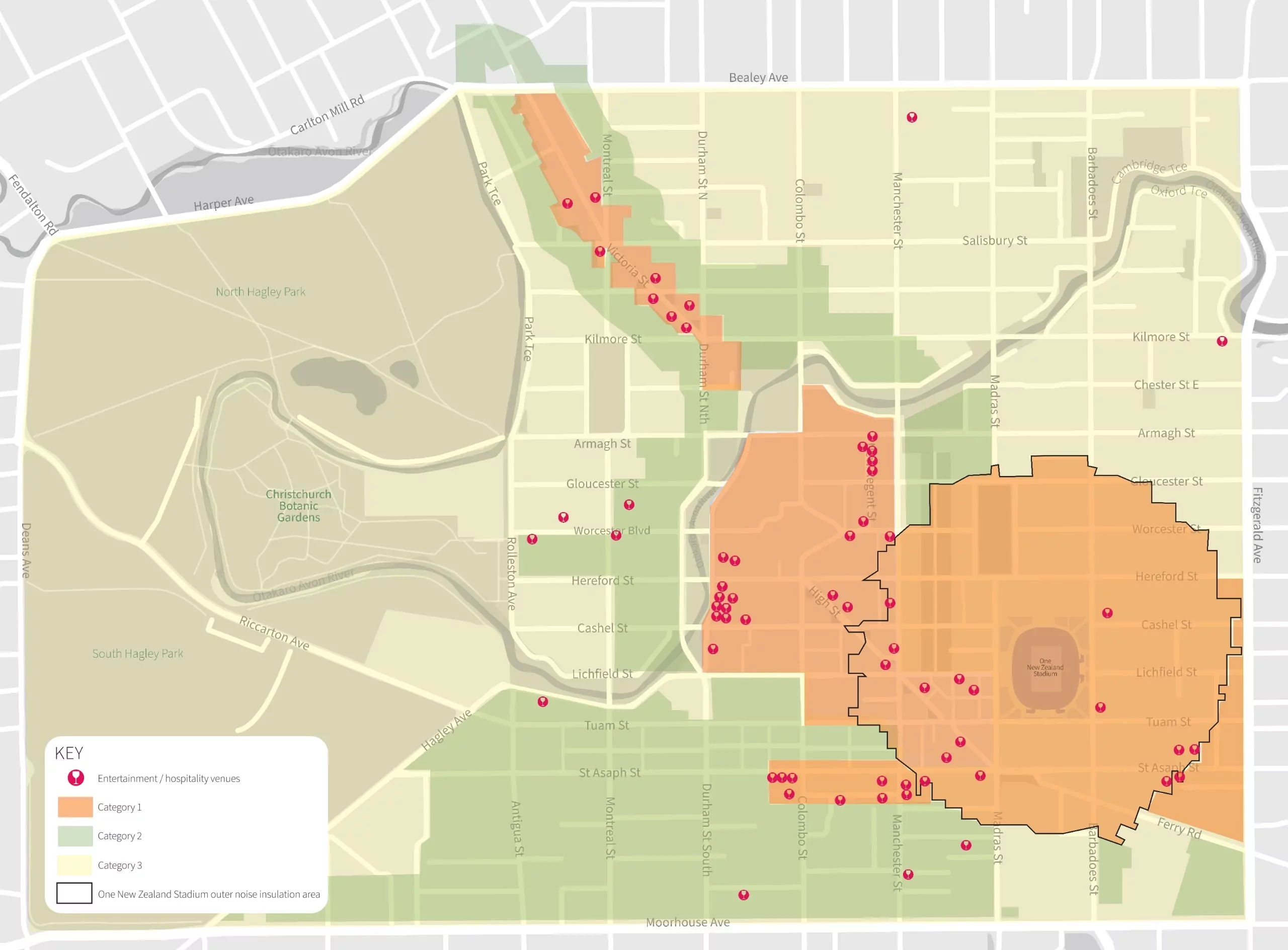
Source: Christchurch City Council
